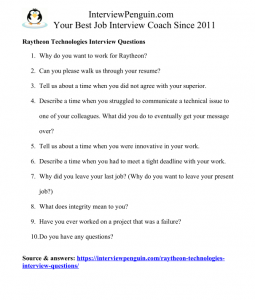Let’s have a look at twenty screening and scenario based questions you may face while interviewing for any job at Raytheon. Technical questions differ from one interview to another, depending on your specialty, and position in their organization. Hence it makes no sense to discuss them in this article. Let’s start!
Table of Contents
Why do you want to work for Raytheon?
Try to demonstrate two things with your answer:
- Positive associations you have with the brand of Raytheon, their values, products, innovations.
- How the job fits your skills, experience, and career goals.
Raytheon is a leader in innovation. Throughout the century they (or their predecessors) played their part in many armed conflicts, utilizing the newest technologies to help US troops or their allies end up victorious.
If you are patriotic and support the army, you can definitely refer to it in your answer. You like what the company does, and that’s the reason why you applied with them, and not with someone else, some other tech giant.
You can also mention some of their latest innovations or divisions that are particularly appealing to you, and cite them as a reason for your application. Perhaps they pose a perfect match for your engineering skills, considering the stuff you worked on in your last job.
Can you please walk us through your resume?
You have just one resume, but you can talk about your education and experience in many different ways. Try to point out the most relevant things, such as duties you had and projects you worked on before, especially if there is a good chance you will be responsible for similar duties while working for Raytheon.
Remember that confidentiality is very important at Raytheon. Do not talk about particular product names, and do not reveal any technical details or innovations you’ve worked on before. You will be bound with confidentiality in your new job, and they should get an impression that you can keep your mouth shut.
Tell us about a time when you did not agree with your superior.
Try to avoid referring to pointless personal conflicts, and focus on something work related. For example when you had another idea about a certain process or technical issue in work, and your superior did not agree with your proposal, or they did not give you a green light to proceed with the changes you suggested.
Critical feedback is very important in all tech companies that want to be successful. Ensure the hiring managers that you are not scared to challenge the opinion of your managers, and are also ready to be challenged by them.
At the same time, however, you will eventually oblige the line of hierarchy (also critical at Raytheon). Talk about a situation when you shared your feedback and opinion, without emotions. You gave them your arguments, explained your reasoning, but eventually you let them to make the final decision–because it was their responsibility.
Describe a time when you struggled to communicate a technical issue to one of your colleagues. What did you do to eventually get your message over?
Raytheon is well-known for its matrix organization of employees. You will report to several bosses. Some of them will be technicians, some managers. You need to adjust your language, and a way in which you explain things, according to the person you talk to at the moment. Try to describe such a situation from your past job.
For example, you tried to explain a benefit of some technical solution or new procedure to someone from marketing or finance. Instead of focusing on technical details, you talked business.
You explained clearly the competitive advantage the solution will provide for the given product (something marketers can work with in their campaigns), and how much it will cost to proceed with the innovation (something that interests the finance manager of the project).
Ensure the hiring managers that you do not live in your technical bubble, and do not mind using demonstration, practical examples, and other means of getting your message over to people from various departments of the company.
Tell us about a time when you were innovative in your work.
At the end of the day, they do not hire you for an engineering positions which pays 100K a year just to copy the stuff and processes they already have in place. They want you to be innovative, to come up with new ideas within the scope of your job, to improve things.
Describe a time when you suggested some improvement to a certain process or policy or anything else that isrelevant to the job you try to get with Raytheon. Try to speak with enthusiasm about the innovation, and describe how it helped you to save either money or time of your employer.
Ensure the interviewers that you want to bring new ideas onboard, and have both intellectual capacity and experience to do so, on a regular basis.
Describe a time when you had to meet a tight deadline with your work.
We talk about big contracts in aerospace and defense manufacturing here. Millions of dollars, and often billions of dollars. Sums that can definitely make your head spin.
As you can imagine, there’s not really a margin for error or for delay in this work. Talking about a situation from the past, describe how you prioritized your work, stayed overtime, or even asked your manager to allocate additional resources to your team or project, to eventually meet the deadline.
Whether you succeeded or not isn’t the most important thing for the hiring managers. As long as they see that you tried your best, and did all you could to meet the deadline, they will be satisfied with your answer.
Special Tip: You can also download the list of 10 questions in a one page long PDF, and practice your interview answers anytime later:
Why did you leave your last job? (Why do you want to leave your present job?)
Money should not be the only reason why you consider leaving your current employer and joining the ranks at Raytheon. Because if it was your main reason, then you’d leave also Raytheon, as soon as a better offer rang your inbox. And they do not want to hire someone with this attitude.
I suggest you to refer to one of the following reasons:
- The technology. You want to work with the most modern technology and equipment, which is available at Raytheon, but you didn’t have a chance to work with such an equipment in your last job.
- Particular specialty of your work. You have always wanted to work in aerospace, or even in a particular department of it. When such a job finally became available, you decided to apply for it.
- Inability to progress in your present job. You do not feel intellectually challenged anymore. Nothing new to learn, no new designs to work on. You want to put your intellectual capacities to the test again, and work on stuff that fascinates you.
Avoid referring to conflicts you had with your former boss. If they terminated your contract, however, you should be honest in your answer. Maybe you made a mistake and you had to go. It can happen to everyone, including the best managers and engineers. You learned your lesson, and won’t repeat the same mistake again in your new job.
What does integrity mean to you?
You’ll work with sensitive information and data at Raytheon. It is absolutely pivotal to have strong moral principles, and to invariably stick to your promises. You can use one of the following answers:
- Integrity is something I’d like to achieve in my team. If we really work as a team, and are unified in our actions and goals, if people cooperate with each other instead of competing, we will achieve amazing results. I have an experience with leading such a team in one of my last jobs, and it is something I’d like to achieve working for you as well. It’s not an easy task, and as a leader I have to show integrity first, before expecting it from my people.
- For me it means to do the right thing, always. Not the best thing for my well-being or personal profit, but the best thing for the entire community, team, human society…
* You can check 7 sample answers to “What does integrity mean to you?” interview question in our separate post.
Have you ever worked on a project that was a failure?
You should be able to admit making a mistake. Any experience you narrate, try to avoid blaming the others for the failure, such as a project manager or a particular employee who made some critical error or neglected something in their work, and the entire project failed as a reason.
The keys is to speak in a matter of a fact way. Explain clearly what was the goal of the project, what milestones you set, what exactly happened, and in which way your team failed to reach your target. If you were the project manager, you should accept the responsibility for the failure.
Tell them about the lessons you learned in the given situation, and how they helped you to become even better in your job. We can hardly progress without failing. It’s the part of the process, and you take it as such.
Do you have any questions?
You do not have to force a question. If things went well and you feel that you explained everything important–in terms of your working experience and expectations, and if you feel that you made a good connection with the hiring managers, you can simply thank them for their time and wish them good luck.
Obviously you can ask about anything you want at this point, but I suggest you to not inquire about your salary or employee benefits. If they consider hiring you, they will start this discussion sooner or later (possibly also after the interview).
Other questions you may face while interviewing for a job with Raytheon Technologies
- Tell me about an obstacle you overcame.
- Describe the most difficult decision you’ve ever made.
- What is the biggest mistake you’ve made in your career?
- Describe a time when you struggled to build a relationship with someone important. How did you eventually overcome that?
- Give an example of a time you showed initiative at work.
- Give an example of an occasion when you used logic to solve a problem.
- Describe the situation in which you were able to use persuasion to successfully convince someone.
- Tell me about a time when you had to make a decision without all information you needed.
- Have you ever worked on a project that was a failure?
- Tell me about a time you had to comply with a policy or procedure that you did not agree with.
- ….
* Special Tip: * Special Tip: If you are not sure how to answer the questions from my list, or experience interview anxiety, have a look at our Interview Success Package. Up to 10 premium answers to 31 most common scenario-based questions (+ more) will help you streamline your interview preparation, find the right words in every moment of the interview, outclass your competitors, and eventually get the job with Raytheon. Thank you for checking it out!
Conclusion, next steps
Job interviews with Raytheon Technologies belong to interviews with average difficulty. The hiring managers will ask you some scenario based questions (just as we described in this article), trying to understand your attitude to various situation that happen in the workplace. Proactive approach, integrity, innovation, and attention to detail are some of the attributes they look for in great job candidates.
They will also ask you some technical questions, but these change from one interview to another, and depend on the particular position you try to get with Raytheon. They may also assess your technical expertise with an online test.
Polish the knowledge of your specialty, read the job description carefully, and learn as much as you can about Raytheon before interviewing for the job. If you spend enough time preparing for this interview, and get ready for the scenario-based questions, you will succeed. We wish you good luck!
May also interest you:
- Salary negotiation tips – Be ready when the time comes to discuss money.
- How to overcome interview nerves – Simple guide on how you can get rid of interview stress forever.



